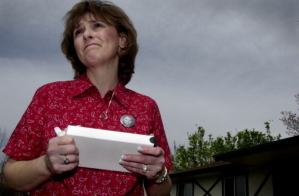Beth Nimmo, the mother of Rachel Joy Scott, the first student killed in the Columbine High School massacre in 1999, has shared how her Christian faith allowed her to forgive her daughter's murderers and use her story to inspire others.
Rachel, a 17-year-old student known for her Christian faith throughout the Colorado school, was sitting on a patch of grass eating lunch with her friend when 18-year-old Eric Harris and 17-year-old Dylan Klebold approached her, shooting her three times. After realizing Rachel was still alive, the killers returned and asked her, "Do you still believe in God?" She answered, "You know I do", whereupon he replied "Then go be with Him" and shot her in the head.
In an exclusive interview with The Gospel Herald, Nimmo, 63, shared how the road to forgiveness wasn't easy - but Rachel's example and her own Christian faith eventually enabled her to come to a place of peace and reconciliation.
"The Lord commands us to forgive, and I know Rachel would have forgiven her killers," Nimmo said. "She was on their target list and she had tried to reach out to them - she'd already put herself out there where her shooters were concerned... I forgive, because for Rachel, that day was a life sentence. But, for it to not be my life sentence, I have to turn it over to the Lord and say, 'It wasn't right, but I want you to free me in my heart and mind from living in the pain of that moment.'"

Nimmo has authored several books about Rachel's life - "Rachel's Tears" and "The Journals of Rachel Scott" - and shares her daughter's story with students around the world to relay the importance of inclusion, compassion, and forgiveness.
"I share the point that if I had to face those two shooters that day and I said, 'I forgive you,' they would have laughed and mocked me to my face," she explained. "But, forgiveness is about you, not them, it's giving you the key to unlock the emotional and physical prison that the violator put you in."
Nimmo emphasized that it's crucial to understand that forgiveness doesn't mean saying everything is okay: "A lot of people are afraid to forgive, because they think it means what happened to them, the violation, whether it was emotional, physical, financial thing, that forgiveness means what happened to them is okay," she said, "But forgiveness doesn't mean that violation is okay, and I share that all the time with kids, because forgiveness isn't for the violator, it's for the person."
Nearly 17 years after her death, Rachel's story will be told in an upcoming film, I'm Not Ashamed, which examines the young woman's courage, deep faith, and love for others. The film, which hits theaters Oct. 21, is based on journals and pictures Rachel left behind, in which she wrote about her faith and expressed a prophetic belief that her life would be cut short.
"Rachel was saved when she was 12, and she started writing close to that time period," Nimmo said. "But, it was very private; we didn't know how God was using her. She didn't talk about how she loved and ministered to people, and she didn't tell us about these visions of premature death...The Lord kept that private, between Him and her. What we are able to share with the public is very pure. Nothing interrupted what was happening in her heart."

Nimmo hopes the film, which stars Sadie Robertson and Ben Davies, will inspire viewers of all ages and encourage students to stand firm in their faith and understand that they're not alone - regardless of what society tells them.
"By sharing Rachel's story, we're talking about a young girl who faced peer pressures and how she fought to be authentic, and we show her struggles," Nimmo said. "It wasn't easy; she struggled at times, but she's honest and she poured her heart out to the Lord and is constantly asking to be used by Him. He honored that request and He helped her stay true to what she wanted to do."
She added, "Kids today are constantly faced with double standards and mixed signals - culture is cultivating their values and what's important. The church needs to counteract those influences; it's difficult for kids today - they don't know what truth looks like and they're searching everywhere. Kids that love the Lord feel isolated, that they're the only ones. Rachel talks about it. This brings it all out - the movie is honest. We've tried to be true to her writing, and it's just as relevant for kids today as it was 17 years ago."






